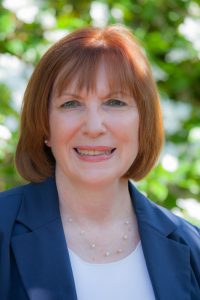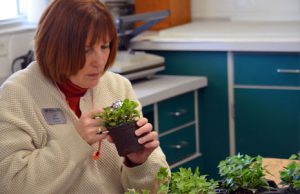Last Updated on June 23, 2020 by Caroline Warwick
Dr. Liz Felter began her journey in horticulture at a time when university professors didn’t know if it was appropriate for women to learn how to use a chainsaw or front-end loader tractor.
Needless to say, a lot has changed since the 1970s.

Felter was in only the second class at the State University of New York at Cobleskill that allowed women to major in their two-year horticulture program. Out of the seven women in this class, it was clear men made up a majority of the group and many, professors included, were not sure what to expect of women peers and students.
“I grew up in a generation with a lot of grit and with parents who witnessed the Great Depression,” Felter said. “My parents often said ‘what doesn’t kill you makes you stronger’ and were determined to not let us kids go hungry.”
Felter grew up on a ‘ranchette’ in rural New York state where she was a 4-H horse club participant. At the age of 17, she had her first experience with plants in a greenhouse that was part of a flower shop. The determination of her parents resonated with her and grew over the years as Felter became the first college graduate in her family.
Women in Industry and Academics
Felter graduated from The Ohio State University as a double major with bachelor’s degrees in horticulture and agricultural communications. She felt a four-year degree was necessary for managerial positions in the workplace and made returning to school a priority.
“I once did not get a job because a high school thought a woman could not coach a winning tractor driving team,” Felter says. “They had a state title they did not want to lose.”
In the 1980s, Felter gained a lot of her experience as the grounds supervisor of the Marriott’s Orlando World Center and its hotels’ 6,000 interior plants and 26,000 balcony-hanging plants. Here, Felter managed the planting and maintenance of all on-site plants while building relationships with the Central Florida horticulture industry; folks she still works with today in UF/IFAS Extension. Marriott management though was unsure if a woman should be around the 1200 male construction workers that built the hotel.

“Little did they know, I would speak my mind and get the job done at the same time,” Felter said.
Felter noticed women outnumbered men when she returned to the University of Florida to pursue a doctorate degree after a professor told her she had ‘untapped potential’ that should be put to use.
“When I started in the industry, it was about 90 percent men and 10 percent women,” Felter said. “Now, it is about 40 percent men and 50 percent women, which is great because everyone brings different strengths to the table.”
All of the Above: School, Family and Work
It took eight years for Felter to finish her doctorate degree in agricultural communications and leadership at UF, while simultaneously raising a family and working full time in Orange County Extension. Along with the fact that none of the classes were online and were only offered at the UF campus in Gainesville.
“My husband and I think we are invincible, so we thought ‘bring it on!’ but the real surprise was when we found out we were having twins,” Felter said. “I am lucky to have a supportive partner in my husband and we were ready to take anything head on.”

Currently, Felter is a UF/IFAS regional specialized Extension agent in the Central District with a focus on education and training for the commercial nursery and greenhouse industry as well as food systems in Central Florida. With an office at the Mid-Florida Research and Education Center in Apopka, Felter also manages the on-site UF/IFAS Diagnostic Plant Clinic.
Felter’s research is a combination of social sciences with traditional horticultural sciences. Her focus is to collect qualitative research to better understand human behavior change in agricultural and horticultural topics. She has worked in the areas of local food systems and water conservation.
Advice to Women
Felter’s advice to women who want to enter the agriculture and horticulture field is to volunteer at an organization that interests you and ultimately, believe in yourself.
“If it is what you want to do, believe in yourself and just do it,” Felter said.
Whether it was the professor who pushed her to get her doctorate degree or the support of her husband, Felter had a strong network to help her achieve her academic and career goals.
“Working at UF has given me many opportunities and opened so many doors,” Felter said. “Things will probably not go as you planned but be open to all opportunities and take them.”
 0
0
